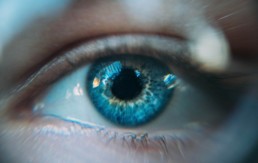
Poets may write about sounds and smells from time to time, but the eyes are referenced far more often. They are considered windows to the soul, and many believe they hold a person’s truth and wisdom.
In Chinese culture, this is especially true. Studies show that when the Chinese are reading the facial expressions of others, they focus on the eyes rather than the mouth to understand the speaker’s emotions.
This isn’t so in Western cultures, which put equal meaning on the eyes and mouth in interpreting the emotions of others.
It is no surprise, then, that caring for the eyes is an important part of traditional Chinese medicine. A variety of therapies are specifically designed to strengthen vision.
Many practitioners rely on the use of customized combinations of certain herbs. Seven, in particular, have been shown through evidence-based research to be effective.
Symptoms of Poor Eyesight
Some changes in vision are to be expected as you grow older. In the same way that reduced skin elasticity and greying hair come along with aging, you are also likely to experience some or all of the following once you leave your thirties:
- A decrease in your ability to focus on things that are close to you
- A reduction in the accuracy of your depth perception
- A longer transition period when adjusting between light and dark spaces
- More sensitivity to glare
- Lower sensitivity to contrast
- Reduced ability to identify variations in color
- A need for more light to perform tasks like reading, sewing, and using hand tools
The herbs used in traditional Chinese medicine are most effective at delaying the onset of these symptoms of poor eyesight.
Some symptoms can signify serious conditions that must be treated immediately. While the herbs used to promote eye health in traditional Chinese medicine may support recovery, you must see your optometrist right away if you experience any of the following:
- Blurred, hazy, or double vision
- Light flashes
- Halos or rainbows around lights, particularly at night
- Acute pain in or around your eyes
- Chronic pain in or around your eyes
- The appearance of floating spots and/or floating spots of light
- Extreme light sensitivity
- Excessive redness, swelling, burning, itchiness, or discharge in or around your eyes
- Sudden changes in your vision
- Change in color of any part of the eye, including the pupil, iris, or sclera
- Ascending or descending loss of vision in either or both eyes
Each of these symptoms can signal progressive disease that, if left untreated, may result in permanent loss of vision.
What Causes Poor Eyesight According to Chinese Medicine
Chinese medicine is founded on the concept that all organs, tissues, and systems are interconnected.
Chi, the vital life force that flows through all things, circulates throughout the body. That means that no medical condition is stand-alone. While issues may present as vision loss, that is merely a symptom of a larger problem.
In traditional Chinese medicine, the liver and eyes share a strong connection, and the liver meridian must be clear and unblocked for Chi to flow smoothly between the two. A disruption in this connection quickly leads to vision problems.
Poor eyesight can be caused by the sort of lifestyle factors that deplete and block the flow of Chi. These include poor diet, high levels of stress, lack of sleep, and limited physical activity.
In some cases, reducing these factors and restoring Chi can support improved vision. However, it is often necessary to couple the reduction in negative lifestyle factors with treatments that actively strengthen and unblock Chi.
That’s where therapies like qigong, acupuncture, and traditional herbal remedies come in.
Natural Treatment Options for Poor Eyesight
Your practitioner is likely to create a customized herbal remedy that meets the specific needs of your body. That may include any number of medicinal herbs known to strengthen the eyes, improve vision, and promote healthy flow of Chi.
These seven herbs that help eyesight are frequent choices among practitioners of traditional Chinese medicine:
- Goldenseal, or Hydrastis canadensis, is a mainstay in herbal remedies for its antimicrobial and antiinflammatory properties. That makes it particularly effective for eye conditions brought on by liver heat, a result of liver Chi stagnation, including painful, bloodshot eyes, inflammation of the eyes or tear ducts, and burning, itching, redness, or swelling of the eyes and surrounding area.
- Grape Seed, and especially grape seed extract, contains particularly high levels of proanthocyanidins. These compounds are effective in the prevention and treatment of cataracts. They work to maintain the clarity of the lens, which delays the need for invasive cataract surgery. From the perspective of traditional Chinese medicine, issues like cataracts and edema or cysts around the eyes can result from a deficiency of Chi in the spleen. Grape Seed supports restoration of spleen Chi, which improves eye health and contributes to whole-body wellness.
- Bilberries contain anthocyanins, which support restoration of liver blood flow when Chi has been depleted or blocked. The anthocyanins stabilize collagen fibers, strengthen capillaries, prevent platelets from sticking together, and reduce inflammation – all critical to eye health. In particular, these properties protect against glaucoma, which results from reduced blood flow to the optic nerve. In traditional Chinese medicine, this is related to a deficiency in the blood and Chi moving between the liver and the eyes.
- Gingko Bilboa is often cited as a remedy to protect cognitive function. The same properties that support brain health are also critical to eye health. Gingko Bilboa reduces certain types of changes in the blood, such as changes in viscosity. That’s the extent to which blood gets thick and sticky, preventing it from flowing easily through the body. When blood is too thick, it can cause damage to the capillaries – the tiny blood vessels found throughout the body, including the eyes. That’s important, because damaged capillaries or microangiopathies, can lead to retinopathy which is closely associated with vision loss and can eventually lead to blindness.
- Green Tea is chock full of catechins, which are a type of antioxidants. Catechins neutralize free radicals, protecting cells and tissues from damage. This is particularly important in the eyes, which are made of some of the body’s most delicate tissues. Green tea is particularly helpful in supporting the retina, preventing blurred vision and protecting peripheral vision.
- Saffron, or Crocus sativus, is perhaps best known for delivering subtle flavor to savory dishes. Somewhat less well-known is the fact that it offers antioxidants and has anti-inflammatory properties. That makes it helpful in improving eye health, particularly when liver Chi stagnation is the underlying issue.
- Turmeric, or Curcuma longa, is the bright yellow spice that is commonly found in Eastern cuisine. The yellow comes from curcumin, which is the specific compound that offers medicinal properties. Among other uses, turmeric is antiviral, antibacterial, and antifungal, all of which have applications in preventing and treating eye-related conditions that affect vision.
In terms of herbs that help with eyesight, these seven have been proven effective, however there are a variety of other possibilities that your practitioner may recommend, based on your particular needs.
You can boost the effectiveness of any remedy by focusing on whole-body health and well-being.
Stress reduction is an important starting point, along with good nutrition, plenty of gentle movement, and deliberate effort to increase mindfulness as you move through your day.
What’s Next?
About the author

